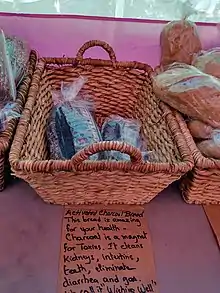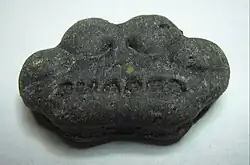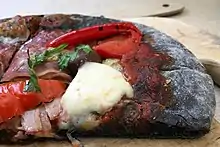

Charcoal is used in food to colour it black and for its supposed health benefits.
Activated charcoal, typically made from bamboo or coconut shell, is used as a food ingredient. It gives food an earthy, smoky taste and the black colouring gives the food an exotic, fashionable appearance.[2]
Some health benefits have been claimed for charcoal back to classical times, when Hippocrates and Pliny recommended it for conditions such as anthrax and vertigo. Activated charcoal adsorbs chemicals and so may bind to both toxins and vital nutrients such as vitamins; therefore, it may also make prescription medications less effective. Its effects are therefore broad and indiscriminate.[2][3]
Chefs and food retailers that have pioneered the use of charcoal in food include Ferran Adrià, Burger King, René Redzepi, Simon Rogan and Waitrose.[4][5]
Activated charcoal is the primary ingredient in black ice cream, which is often served with a black cone also containing charcoal. The ice cream usually contains other flavorings such as horchata, almond, and coconut in order to mask the taste of the charcoal.[6][7][8]
See also
References
- ↑ Victoria Chandler (1 June 2017), "Waitrose has launched black-based charcoal pizza", Good Housekeeping
- 1 2 Rebecca Nicholson. Morwenna Ferrier (28 June 2017), "It's in smoothies, toothpaste and pizza – is charcoal the new black?", The Guardian
- ↑ Torrens, Kerry (2018-12-04). "What is activated charcoal and is it safe?". BBC Good Food. Retrieved 2020-10-11.
- ↑ Jamie Waters (9 April 2015), "Charcoal has become the hot new flavouring in everything from cocktails to meat and mash", Independent
- ↑ "Charcoal food trend: where to eat it and how to cook with it", Olive, 11 August 2015
- ↑ "The secret to that black ice cream you've seen everywhere". DailyDot.com. 28 April 2017. Retrieved 18 December 2017.
- ↑ "I Actually Tried That Black Ice Cream And Here's What It Tasted Like". Buzzfeed.com. Retrieved 18 December 2017.
- ↑ Walansky, Aly. "This Goth ice cream is here to crush the unicorns". Today.com. Retrieved 18 December 2017.
